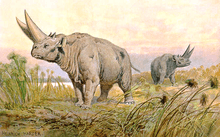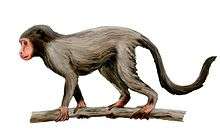Jebel Qatrani Formation

The Jebel Qatrani Formation is a palaeontological and geologic formation located in the Faiyum Governorate of central Egypt.
Conformably overlying the Qasr el Sagha Formation. It is exposed namely between the Jebel Qatrani escarpment and the Qasr el Sagha escarpment, north of Birket Qarun lake near Faiyum.
Geology
These rocks were laid down in the Eocene-Oligocene period (Priabonian - Rupelian). This formation was originally thought to be between 35.4 and 33.3 million years old, based on initial analysis of the formation. However, analysis by Erik Seiffert in 2006 concluded that the age of the Jebel Qatrani Formation should be revised. His assessment of more recent evidence indicates an age for most of the formation of between 30.2 and 29.5 million years ago, placing it almost entirely in the Early Oligocene. Seiffert states that only the lowest 48 metres was laid down in the Eocene,[1] but recent opinion holds the original hypothesis of a sediment straddling the Eocene-Oligocene boundary to be correct.
Mostly sandstones deposited by meandering rivers and seasonal lakes, the lower (Eocene) part of the formation represents a woodlanded ecosystem of which lots of petrified wood also remain. In contrast, the upper (Oligocene) layers present indication of much drier and cooler conditions, with savanna replacing the woodland for several million years before the climate turned wetter and warmer again and the forests regrew.
The fauna changes also notably during this time, which seems to be coincident with the Eocene–Oligocene extinction event recorded in Eurasia.
Fossils

Mammals
- Arsinoitherium zitteli, an arsinoitheriid
- Bothriogenys fraasi, an anthracotheriid
- Herodotius pattersoni, a pseudoungulate
- Plesiopithecus, an enigmatic lemur-like primate
- Pliohyracidae, large hyraxes
- Ptolemaiida, carnivorous afrothere mammals
- Qatranilestes and Widanelfarasia, relatives of golden moles, otter shrews, and tenrecs
- Several hyaenodontids (Akhnatenavus cf. leptognathus, Metapterodon)
- Several hystricognath rodents (e.g. Acritophiomys bowni, A. woodi, Elwynomys lavocati, Gaudeamus hylaeus)
- A primitive marsupial, maybe related to Peratherium
- Primitive Old World monkeys (e.g. Aegyptopithecus zeuxis, Biretia fayumensis & B. megalopsis)
Birds
- Eremopezus, an enigmatic large groundbird
- Goliathia, a large shoebill relative
- Palaeoephippiorhynchus dietrichi, a large stork
- Xenerodiops, an unusual heron
- A cormorant-like bird, possibly related to genus Piscator
- Several jacanas
- One or two species of primitive osprey and another bird of prey (possibly an ancestral sea eagle)
- A turaco
Other animals
- Albertwoodemys, a side-necked turtle
- "Crocodylus" megarhinus, an ancestral crocodile
- Eogavialis africanum, a primitive gharial
- Parachanna fayumensis, a snakehead fish
- Pterosphenus, a snake
- African tetras (Alestidae) or similar Characiformes
- Catfish, perhaps of genus Fajumia
See also
- Geologic formations of Egypt
- List of fossil sites
References
- ↑ Seiffert Erik R. (Jan 2006). "Revised age estimates for the later Paleogene mammal faunas of Egypt and Oman". Proceedings of the National Academy of Sciences of the United States of America. 103 (13): 5000–5005. doi:10.1073/pnas.0600689103. PMC 1458784.
- Vickers-Rich, Patricia & Rich, Thomas Hewett (1993); Wildlife of Gondwana. Reed. ISBN 0-7301-0315-3